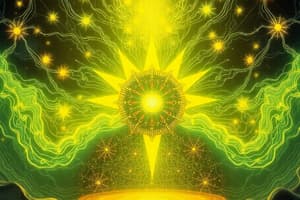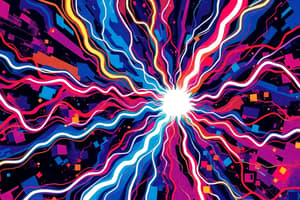Podcast
Questions and Answers
What is an electric circuit?
What is an electric circuit?
A path that allows electric charge to flow in a closed loop of conductors.
How is a magnetic field created around a wire?
How is a magnetic field created around a wire?
When electric current flows through the wire.
What is the role of a battery or generator in an electric circuit?
What is the role of a battery or generator in an electric circuit?
To maintain a potential difference for current flow.
What is electromagnetic induction?
What is electromagnetic induction?
How do magnets produce magnetic fields?
How do magnets produce magnetic fields?
What causes current to flow in an electric circuit?
What causes current to flow in an electric circuit?
Explain the relationship between electric current and magnetic field in a conductor.
Explain the relationship between electric current and magnetic field in a conductor.
How does electromagnetic induction generate electric current in a circuit?
How does electromagnetic induction generate electric current in a circuit?
What role does electric potential play in electric circuits?
What role does electric potential play in electric circuits?
Explain the relationship between magnetic fields and electric potential in a current-carrying conductor.
Explain the relationship between magnetic fields and electric potential in a current-carrying conductor.
What are some applications of understanding the interconnected concepts of electricity and magnetism?
What are some applications of understanding the interconnected concepts of electricity and magnetism?
Why is it important to study the fundamental concepts of electricity and magnetism?
Why is it important to study the fundamental concepts of electricity and magnetism?
Flashcards are hidden until you start studying
Study Notes
Electricity and Magnetism: Exploring Circuits, Fields, Induction, and Potential
Electricity and magnetism form the foundation of our modern world, powering everything from smartphones to massive power grids. To understand these interconnected phenomena, let's delve into four key concepts: electric circuits, magnetic fields, electromagnetic induction, and electric potential.
Electric Circuits
An electric circuit is a path that allows electric charge to flow. It consists of a closed loop of conductors through which an electric current flows. Current flows from a region of high electric potential to a region of low electric potential. In a circuit, this potential difference is maintained by a source, such as a battery or generator.
Magnetic Fields
The behavior of electric charges in motion produces magnetic fields. When electric current flows through a conductor, it creates a magnetic field around the wire. The strength of this field depends on the current and the shape of the wire. Magnetic fields can also be produced by magnets, which have a permanent magnetic dipole moment. The north and south poles of a magnet represent opposite magnetic field directions.
Electromagnetic Induction
Electromagnetic induction is the production of electric current in a conductor due to a changing magnetic field. A changing magnetic field induces an electric field within the conductor, which in turn generates an electric current. Electromagnetic induction underlies the operation of electric generators, transformers, and other essential devices.
Electric Potential
Electric potential, also known as voltage, is the energy per unit charge at a point in an electric field. It is the difference in electric potential between two points in an electric circuit, measured in volts. Electric potential is the driving force for electric current in a circuit. The higher the electric potential difference, the greater the current flow.
How these concepts are interconnected
-
Electric circuits and magnetic fields: When electric current flows through a conductor, it creates a magnetic field. Similarly, a time-varying magnetic field produces an electric current through electromagnetic induction.
-
Electromagnetic induction and electric circuits: Electromagnetic induction generates electric current in a circuit due to a changing magnetic field. This current flow can be controlled using switches and circuits.
-
Electric potential and electric circuits: Electric potential is the driving force for electric current in a circuit. The higher the electric potential difference, the greater the current flow.
-
Magnetic fields and electric potential: The magnetic field of a current-carrying conductor is related to the electric potential difference across that conductor. The strength of the magnetic field is proportional to the current and the potential difference.
Applications
Understanding the fundamental concepts of electricity and magnetism is essential for a wide range of modern technologies, including:
- Electric power generation and distribution
- Electric motors and generators
- Semiconductor devices
- Magnetic resonance imaging (MRI)
- Transformers and other electromagnetic devices
Conclusion
The interconnected concepts of electricity and magnetism provide a deep understanding of the fundamental principles underlying our daily lives. By studying these concepts, we can better appreciate the role that electric circuits, magnetic fields, electromagnetic induction, and electric potential play in our modern world.
Studying That Suits You
Use AI to generate personalized quizzes and flashcards to suit your learning preferences.




